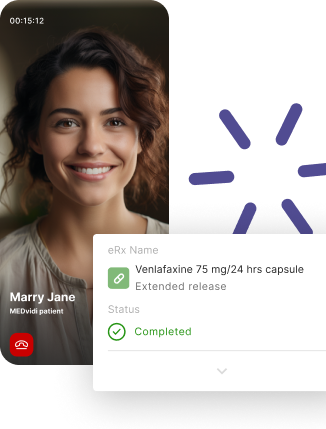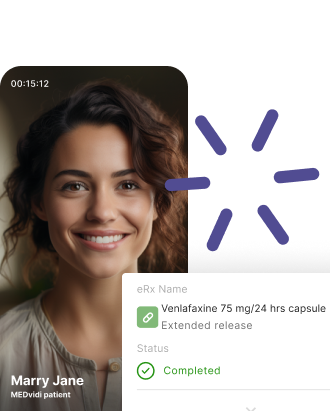Ativan has a
Highlights
- Ativan is a prescription medication used for the treatment of anxiety disorders and anxiety associated with depressive symptoms; not anxiety caused by daily life stress.
- Ativan is available only by prescription issued by a licensed healthcare provider. The choice of this medication or another treatment depends on the details of the health assessment.
- Ativan has a potential for abuse and dependence, so, to reduce the risks, it’s important to follow the clinician’s guidelines during the whole course of treatment.
- Therapy or counseling and lifestyle changes can support the effects of treatment in the long term.
Brand name: Ativan
Generic name: Lorazepam
Drug class: Benzodiazepine
Dosage forms: Tablets, injections
FDA-approved uses: Anxiety disorders, anxiety associated with depressive symptoms
Excessive anxiety can cause significant distress, sleeping problems, and other physical and psychological effects. In severe cases, it can transform into an anxiety disorder and even make a person unable to handle basic daily life activities. To ease or prevent such outcomes, healthcare professionals recommend psychotherapy including cognitive-behavioral therapy (CBT) and can prescribe medications, such as Ativan (lorazepam), when it’s deemed appropriate.
Read on to learn when Ativan is necessary and when other treatments are more suitable, who can prescribe this medication, and if it is possible to get an Ativan prescription online.


What Is Ativan and Who Is It For?
Ativan (
Ativan is a controlled substance because it has a risk of abuse and dependence, so typically, it is not considered a first-line treatment for anxiety. However, it may still be suitable and helpful for many patients.
The choice of the medication is based on a detailed health assessment, some of the aspects including:
- Diagnosis: Ativan (lorazepam) is prescribed for anxiety disorders and depression-induced anxiety. It may also be used for some off-label uses (i.e. not approved by the FDA), such as insomnia.
- History of substance abuse: Due to its habit-forming properties, Ativan is not a suitable choice in this case.
- Comorbid conditions: Lorazepam might cause suicidal thoughts or attempts, so it is not recommended for people with depression. It should also be used with caution in individuals with sleep apnea or problems with the liver or kidneys.
If you’re experiencing suicidal or self-harming thoughts and require immediate assistance, contact a crisis hotline, such as 911, 988 suicide & crisis lifeline (toll-free), or Samaritans (116-123 or via chat).
A healthcare provider may also recommend alternatives if a person is pregnant, breastfeeding, or requires long-term treatment. These can be particular types of antidepressants, anticonvulsants, beta-blockers, and others.

How to Get Ativan Prescribed
Since it is a controlled substance, getting an Ativan prescription requires a detailed consultation with a qualified healthcare professional. The first step is getting your symptoms assessed and receiving a diagnosis, be it during an in-person or an online video appointment. Then your healthcare provider will weigh all the pros and cons of the chosen medication and write a prescription if deemed appropriate.
Here is how to get an online Ativan prescription at MEDvidi:
- Step 1: Sign up. Create an account and fill out the basic information, including any required documents. Choose the date and time of your appointment.
- Step 2: Attend an initial appointment. Your healthcare provider will talk with you about your symptoms, medical history, and your treatment goals. Based on the details you share during the virtual consultation, a healthcare provider will assess your symptoms and make a diagnosis. They might write a prescription if they believe that a medication like Ativan is necessary. The prescription will be sent directly to the pharmacy of choice.
- Step 3: Receive a prescription and pick-up medication from pharmacy: If you get Ativan prescribed online, pick up medication from a pharmacy. Make sure to take the medication exactly as your healthcare provider tells you to and let them know of any side effects you experience.
- Step 4: Attend follow-ups for ongoing care and prescription refills: Schedule follow-up appointments for ongoing care and adjustments of your medication or treatment plan. Ask your healthcare provider about the steps you will need to take to receive refills of medications. Because Ativan is a controlled substance, you may need to have follow-ups with your provider more often than other medications.
MEDvidi offers mental health treatment services in the following states:
MEDvidi providers are able to prescribe Ativan (lorazepam) as a part of online anxiety treatment according to local protocols.
Consult a licensed healthcare professional to learn if Ativan can be helpful in your particular case.
Note that booking an appointment doesn’t guarantee obtaining a prescription. The decision is at the discretion of your healthcare provider.
Who Can Prescribe Ativan?
Since Ativan is a controlled substance under federal regulation, only medical professionals registered with the Drug Enforcement Administration (DEA) are authorized to prescribe it, including:
- Psychiatrists. A psychiatrist is a medical doctor who specializes in the diagnosis and treatment of mental health conditions, including anxiety. They can prescribe Ativan or another medication if appropriate based on your health assessment.
- Primary care physicians. These are medical doctors who provide comprehensive medical care, such as preventive interventions, routine check-ups, and treatment for common medical conditions. These can include doctors of internal medicine (MDs), family physicians, or doctors from other medical specialties. Each of them may be able to prescribe Ativan if they have the necessary training, experience, and license to diagnose and treat anxiety.
- Other medical professionals. Family doctors, nurse practitioners (NPs), and physician assistants (PAs) may also be able to prescribe Ativan if they have the required prescribing credentials and are allowed by their state of practice.
It’s important to only purchase Ativan from an online pharmacy if you have a valid prescription. The pharmacy you purchase the medication from should require a prescription. If you purchase Ativan from unlicensed sources, you have a risk of getting medication that may have dangerous ingredients or dosages. Talk with your healthcare provider if you have questions about where you can purchase the medication with a valid prescription.
What Exactly Does Ativan Do?
Ativan reduces anxiety by slowing down the central nervous system (CNS). To better understand this process, let’s learn more about neurotransmitters first.
Neurotransmitters are chemical messengers in the body that transmit signals from one nerve cell to another in the brain. These messengers have different purposes; for example, GABA (gamma-aminobutyric acid) is an inhibitory neurotransmitter that suppresses excessive brain activity by reducing specific signals sent within the nervous system. That is why it is thought to play a role in calming anxiety and sleep regulation.
By increasing the inhibitory effect of GABA in the brain, Ativan causes calming effects and minimizes the severity of anxiety and panic attacks. It can help with the following typical symptoms associated with anxiety:
- Restlessness
- Irritability
- Muscle tension
It can also help manage sleep disturbances, such as difficulty falling asleep or waking up in the middle of the night.
Depending on the dosage, the person’s metabolism, and the degree of anxiety, the length and strength of the effects can differ. It’s crucial to remember that Ativan’s effects are temporary, and you should take the prescription exactly as your doctor has instructed, never exceeding the dose.

What to Ask Your Doctor About Ativan
When discussing the available treatment options or Ativan in particular, it’s helpful to learn all the ins and outs of the treatment process. In addition to general instructions on dosage and the duration of treatment, consider asking your healthcare provider the following questions:
- What are the most common side effects? How long can they last? How to avoid or reduce them?
- How to know if Ativan is or is not working for me? When is it time to consider an alternative?
- How do I know if I become dependent on Ativan?
- How often should I attend follow-ups and what should I monitor to have more informative and helpful appointments?
- Is there anything I need to know in terms of warnings and precautions?
- What if I decide to stop taking Ativan? Do I need to talk with my healthcare provider before stopping the medication?
Who Should Not Take Ativan?
While Ativan can be an effective treatment for anxiety disorders, there are certain groups of people who should not take it. These include patients with known allergy to benzodiazepines or any ingredients in Ativan.
Some groups of people should not take Ativan, or at the very least may need additional monitoring or considerations to safely take the medication. These groups include the following:
- Patients with a history of drug or alcohol abuse or addiction may be at increased risk of developing a dependence on this medication, as it can be habit-forming.
- Individuals with depression may experience their depression returning, or increased symptoms of depression while taking Ativan.
- Individuals who need to drive, operate heavy machinery, or perform dangerous activities will need to refrain from these activities until they know how Ativan affects them. This is because it can cause extreme sleepiness, dizziness, and slow your thinking and motor skills.

How to Take Ativan Safely
- Typical dosing: Ativan is usually started at the lowest dose possible and only increased to control symptoms. The usual effective dose is 2 mg to 6 mg per day. This may be split into multiple doses throughout the day.
-
How to take Ativan: Ativan should be taken exactly as your healthcare provider tells you. You may be told to take the medication once per day or up to two to three times per day. Do not take it more often or take a higher dose than they instruct you to take.
-
What if you miss a dose: If you miss a dose of Ativan, take it as soon as you remember. If it is almost time for your next dose, skip the missed dose and take your next dose as scheduled.
-
How to store Ativan: You should store Ativan at room temperature. It should be protected from light and kept in a dry area. It’s important to store Ativan in a safe place away from children, such as a locked cabinet.
-
Alcohol: You should not drink alcohol while taking Ativan. This can cause a dangerous interaction causing severe tiredness, breathing problems, coma, and even death.
-
When to talk to your provider: It is important to follow all instructions your provider gives you when taking Ativan. You should not take a different dosage than they instruct you to take. Talk with your healthcare provider about any side effects you experience, and talk with them before you stop taking the medication.
What Are the Side Effects of Ativan?
Side effects are possible with almost all medications, and Ativan is no exception. Its potential side effects include:
- Blurred vision
- Nausea or vomiting
- Constipation
- Dizziness
- Sedation
- Weakness
- Headache
- Fatigue
- Lack of coordination, unsteadiness
- Changes in libido
Some serious side effects of Ativan include the following:
- Mental and mood changes
- Hallucinations
- Suicidal thoughts
- Breathing problems
- Seizures
- Jaundice
Exercise caution when performing tasks that require mental alertness, such as driving, or operating machinery. Ativan can cause drowsiness, dizziness, and impaired coordination, which can influence the process. So, it is advisable to wait until you know how exactly Ativan affects your body or avoid these activities altogether while on Ativan. Consult your doctor for more personalized advice.
This is not a complete list of possible side effects and not everyone experiences the above-mentioned effects, but every patient has to be aware of them. If you experience any severe side effects, seek immediate medical attention.
Addiction and Overdose Risks
Like other benzodiazepines, the use and distribution of Ativan are strictly monitored by the government. One reason for that is potential misuse, resulting in physical or psychological dependence, mostly when used for longer duration or higher doses. To minimize the risk of dependency, you should only take the recommended dose exactly how your healthcare provider tells you. Do not take it for longer than they recommend.
It is also unsafe to stop taking Ativan abruptly. It can lead to withdrawal symptoms, such as sleep problems, irritability, increased anxiety, and muscle spasms. You should consult with your healthcare provider who will gradually reduce your dosage. A specific scheme for tapering off medication will help to avoid withdrawal symptoms.
Aside from dependency, ignoring the healthcare provider’s instructions can increase your risk of an
- Impaired physical coordination that appears out of nowhere.
- Mental confusion
- Speech difficulties
- Passing out or severe drowsiness
- Delayed reflex responses
- Breathing difficulties
It is vital to seek medical attention immediately if you or someone you know has taken more Ativan than recommended due to the risk of an overdose.
Ativan Cost
The supply of thirty 1 mg Ativan tablets can cost from $1500 to $1600 without insurance, depending on the pharmacy and location. The price is significantly lower for a generic version, lorazepam, being $13 to $15, so you can discuss this option with your healthcare provider. However, Ativan is often covered by many insurance plans, and there are coupons available allowing patients to save on this medication, so you can explore if these options are available in your particular case.
Alternatives to Ativan
Alternative medications to treating anxiety include the following:
- Selective serotonin reuptake inhibitors (SSRIs): Prozac (fluoxetine), Zoloft (sertraline), Lexapro (escitalopram)
- Selective-norepinephrine reuptake inhibitors (SNRIs): Cymbalta (duloxetine)
- Buspirone
- Other benzodiazepines: Xanax (alprazolam), Klonopin (clonazepam)
Your healthcare provider will work with you to determine the best treatment for you. They may consider using alternatives to Ativan based on your individual symptoms, age, or your health history.
There are no over-the-counter alternatives to Ativan because all benzodiazepines are available only by prescription. There are some other over-the-counter (OTC) medications and supplements that might help with anxiety, but not all of them are FDA-approved as valid treatment options.
It is important to always consult with your healthcare provider before taking any OTC supplements for anxiety, especially if you are taking other medications, to avoid interactions and unwanted effects.
Lifestyle Adjustments Supporting the Effects of Ativan
While using Ativan, patients can make specific lifestyle changes to benefit most from the medicine. Here are some things to consider:
- Create a calm and supportive environment to better deal with anxiety. Practice techniques like deep breathing or meditation, and surround yourself with supportive individuals who understand your needs.
- Establish a consistent sleep routine and increase physical activity.
- Avoid alcohol and other sedatives while using Ativan.
- Consider therapy or counseling as an additional means of support.
- Regularly attend follow-ups to update your doctor on your progress, any side effects, or concerns.

Summing Up
A person with a diagnosed anxiety disorder can get an Ativan prescription online if it’s considered the most appropriate treatment option for them. The decision is always based on a detailed evaluation of symptoms and health history.
If you want to get your symptoms assessed and receive a personalized treatment plan for anxiety, see a healthcare professional online at MEDvidi.
Frequently Asked Questions
What should I discuss with the doctor before taking Ativan?
Before using Ativan, it’s essential to discuss the following points:
- Your medical background, including any existing or previous conditions.
- Any prescription medications, over-the-counter remedies, or herbal supplements to prevent possible interactions.
- Any pharmaceutical allergies or sensitivities.
- If you are nursing a baby or are trying to get pregnant.
- Any past drug or alcohol addiction.
Can an urgent care doctor prescribe Ativan (lorazepam)?
It’s possible, but unlikely. Usually, a healthcare provider prescribing Ativan will want to have follow-ups with you and have your full health history. Since individuals usually only see an urgent care doctor once, these specialists are less likely to prescribe Ativan for anxiety.
What to say to a healthcare provider to get Ativan?
Be honest with your healthcare provider. Describe your symptoms, share your health history, and talk with them about your treatment goals. They will work with you to determine the best treatment option for you.
Why won’t my doctor prescribe Ativan?
Your healthcare provider will work with you to determine the best treatment. You may have certain symptoms, be of a certain age, or have details in your health history that can make Ativan unsafe for you.
Can a pharmacist prescribe Ativan?
No, a pharmacist is not a licensed healthcare provider able to prescribe Ativan.
How long does Ativan (lorazepam) last?
The duration of Ativan’s effects can change based on the dosage and individual response. Ativan typically has sedative effects that last 6 to 8 hours. However, each person may react differently, so it’s better to speak with your doctor for more detailed information and never exceed the prescribed dose.
Can I be prescribed Ativan while on Suboxone treatment?
Ativan and Suboxone have a













